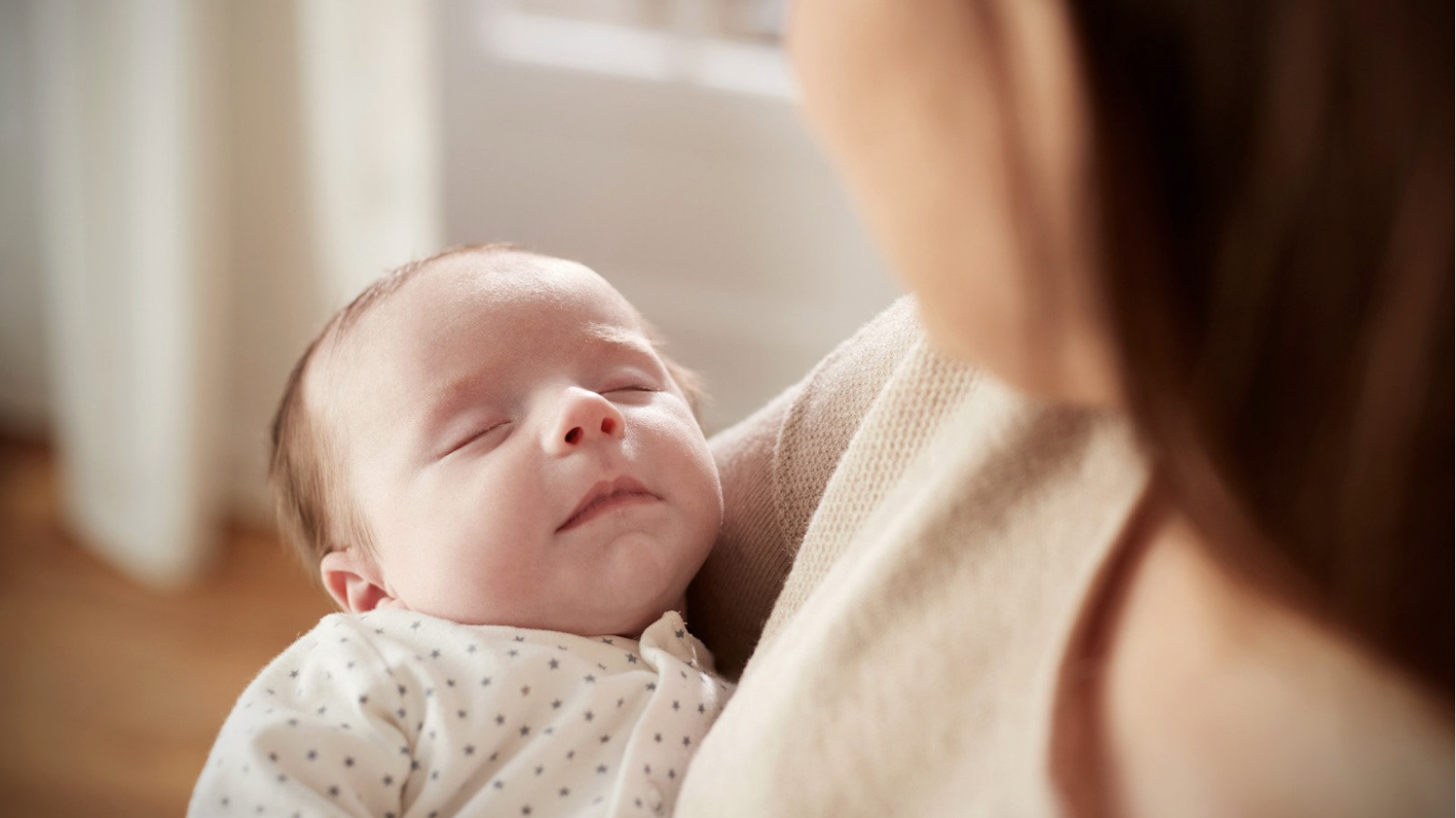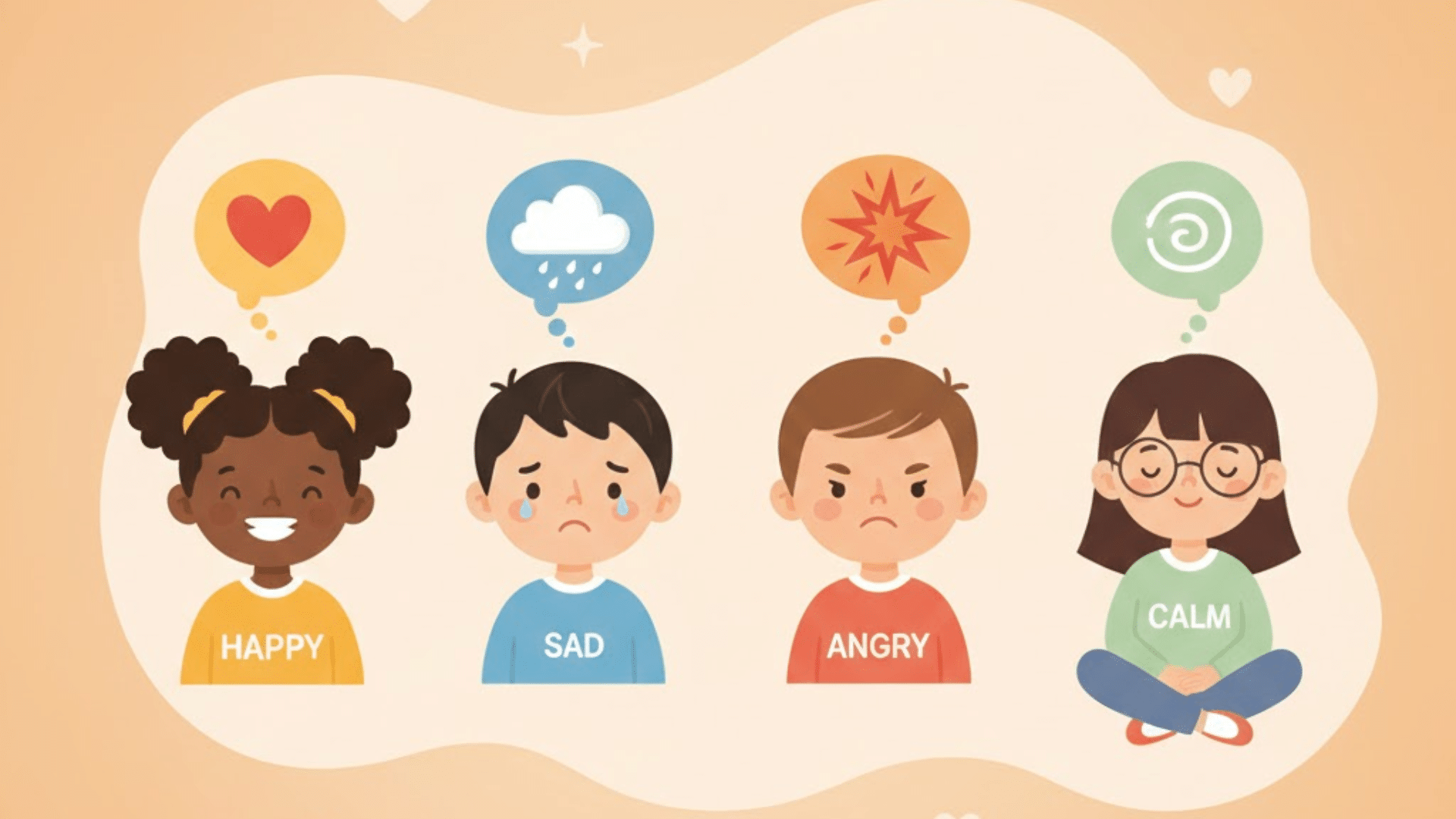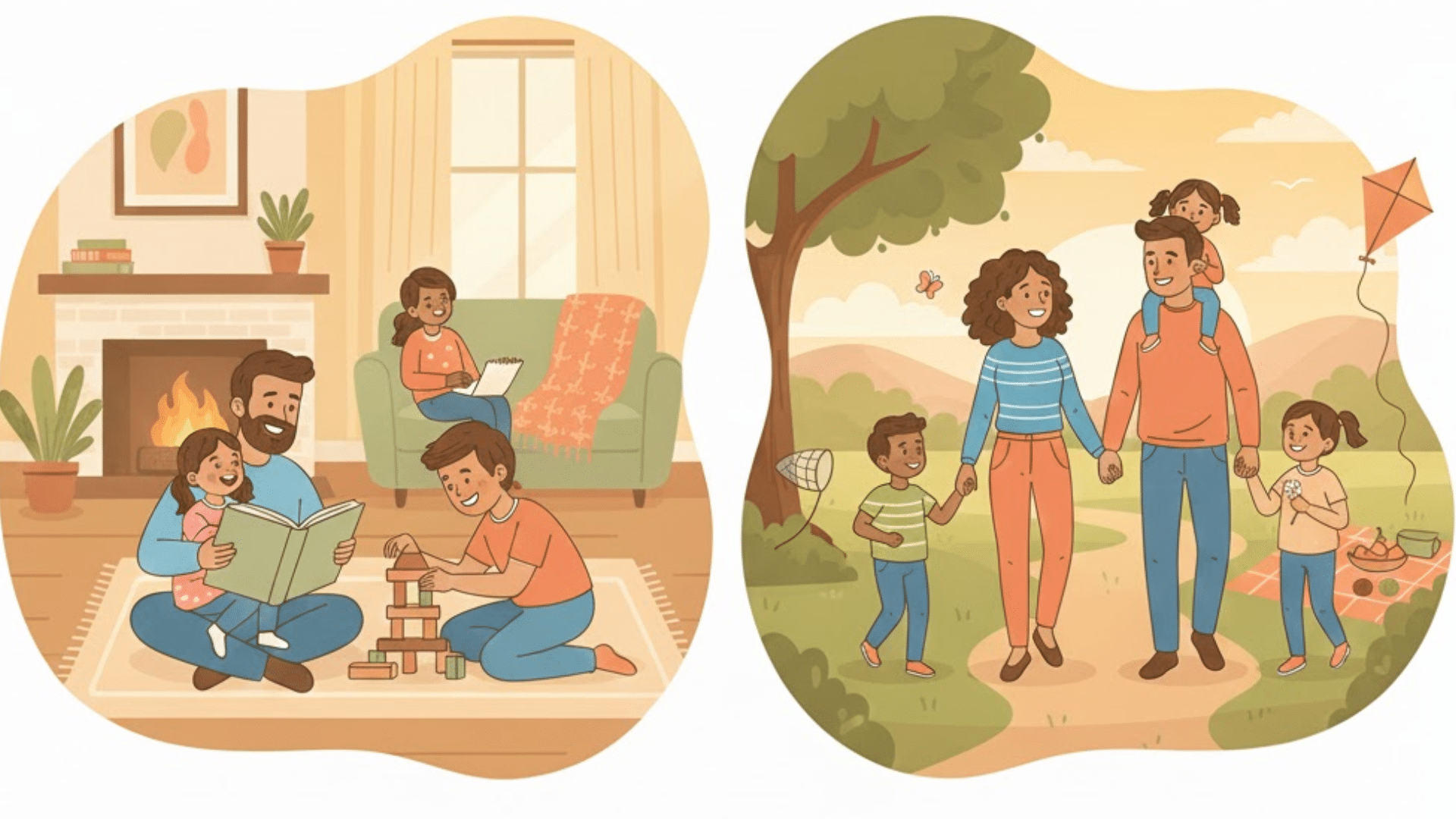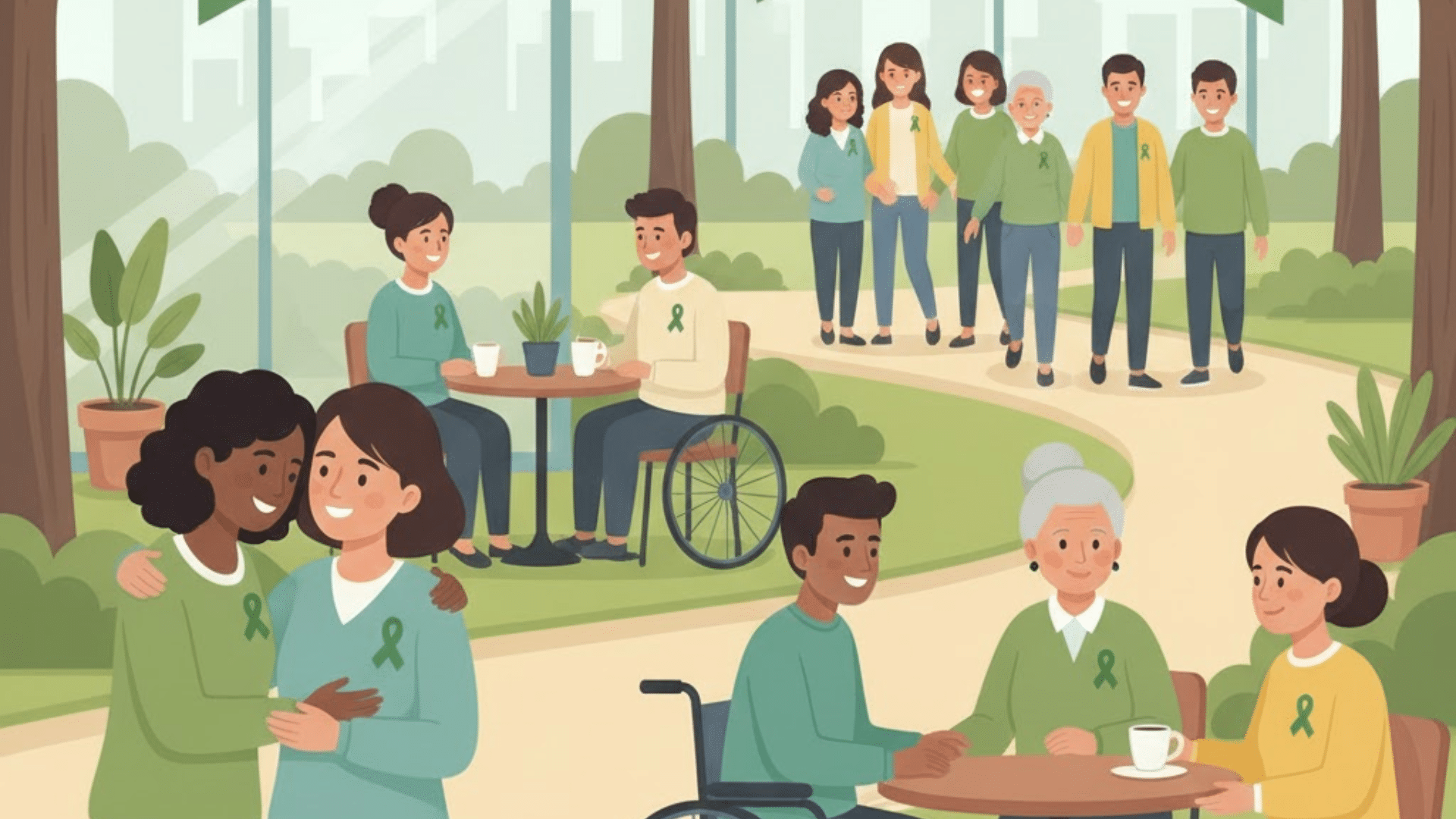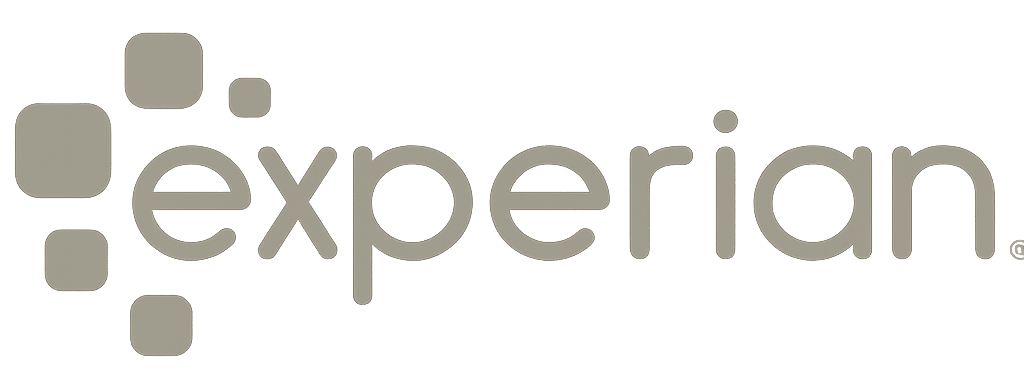When I was preparing for my baby, I felt unsure about what was truly necessary. Every store and website seemed to have endless lists of things.
That’s why I know how valuable a clear newborn essentials checklist can be. It helps you focus on the basics and skip the extras.
In this guide, I’ll walk you through clothing, feeding, diapering, and more. With the right essentials ready, you can feel confident and spend more time enjoying your little one.
Why Newborn Essentials Matter
Having the right essentials ready makes the first weeks with your baby smoother. It saves you time, reduces stress, and helps you focus on building a strong bond.
A clear newborn essentials checklist also prevents unnecessary spending. Instead of filling your home with extras, you’ll have only what truly supports your baby’s comfort and daily care.
Essentials cover every part of your baby’s routine, from feeding and sleep to diapering and health. With them in place, you’ll feel more confident and prepared for the early days.
When to Start Preparing for a Newborn
It’s best to start preparing during your second or third trimester. This gives you enough time to shop, set up, and avoid last-minute stress.
Many parents use a baby shower or registry to plan ahead for their child’s arrival. Registries are useful for organizing what you need and letting others contribute.
Preparing early ensures you have the basics ready before your baby arrives. This way, you can come home from the hospital knowing everything is already in place.
Newborn Essentials Checklist
Below’s a complete breakdown of what you’ll need for your baby’s first months, organized by category.
Clothing Needs
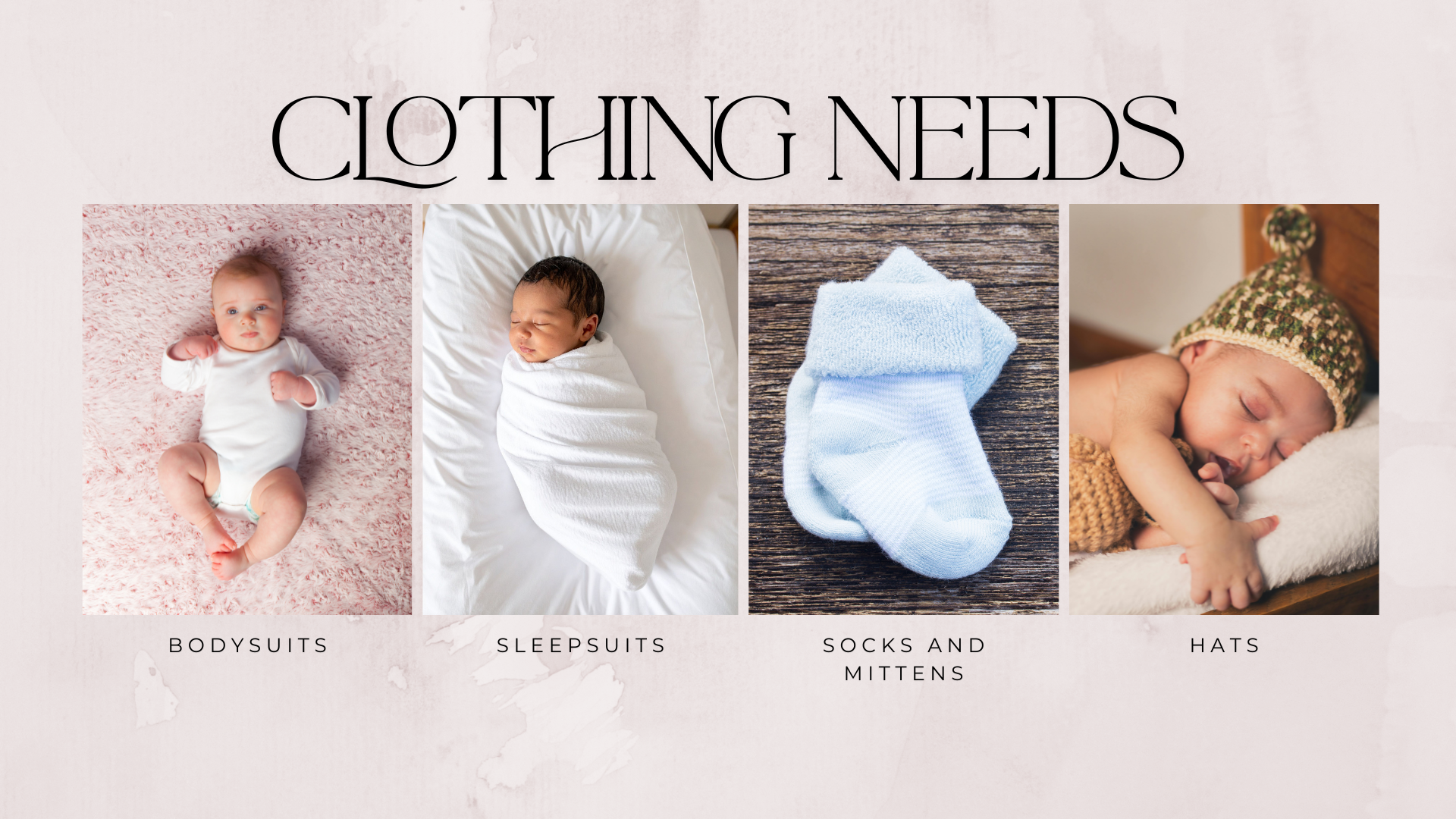
Newborns go through several outfit changes daily due to spit-ups and diaper leaks. Stocking up on soft, comfortable basics helps you stay prepared and reduces laundry stress.
- Bodysuits: Keep 6–8 cotton or organic cotton bodysuits. They’re breathable, gentle on skin, and have snap closures for easy diaper changes. Choose short or long sleeves depending on the season.
- Sleepsuits: Have 4–6 zip or snap sleepsuits. These are ideal for naps and bedtime since they keep babies cozy without blankets. Zippers make night changes quicker, while snaps are also practical.
- Socks and mittens: Newborns lose heat quickly from their feet and hands. Soft socks keep them warm, while mittens prevent accidental scratches. Always choose lightweight, breathable fabrics for comfort.
- Hats: Babies need head coverage for different seasons. Cotton hats protect in warm weather, while fleece or knit hats keep them warm in winter. Avoid hats with strings for safety.
Feeding Supplies
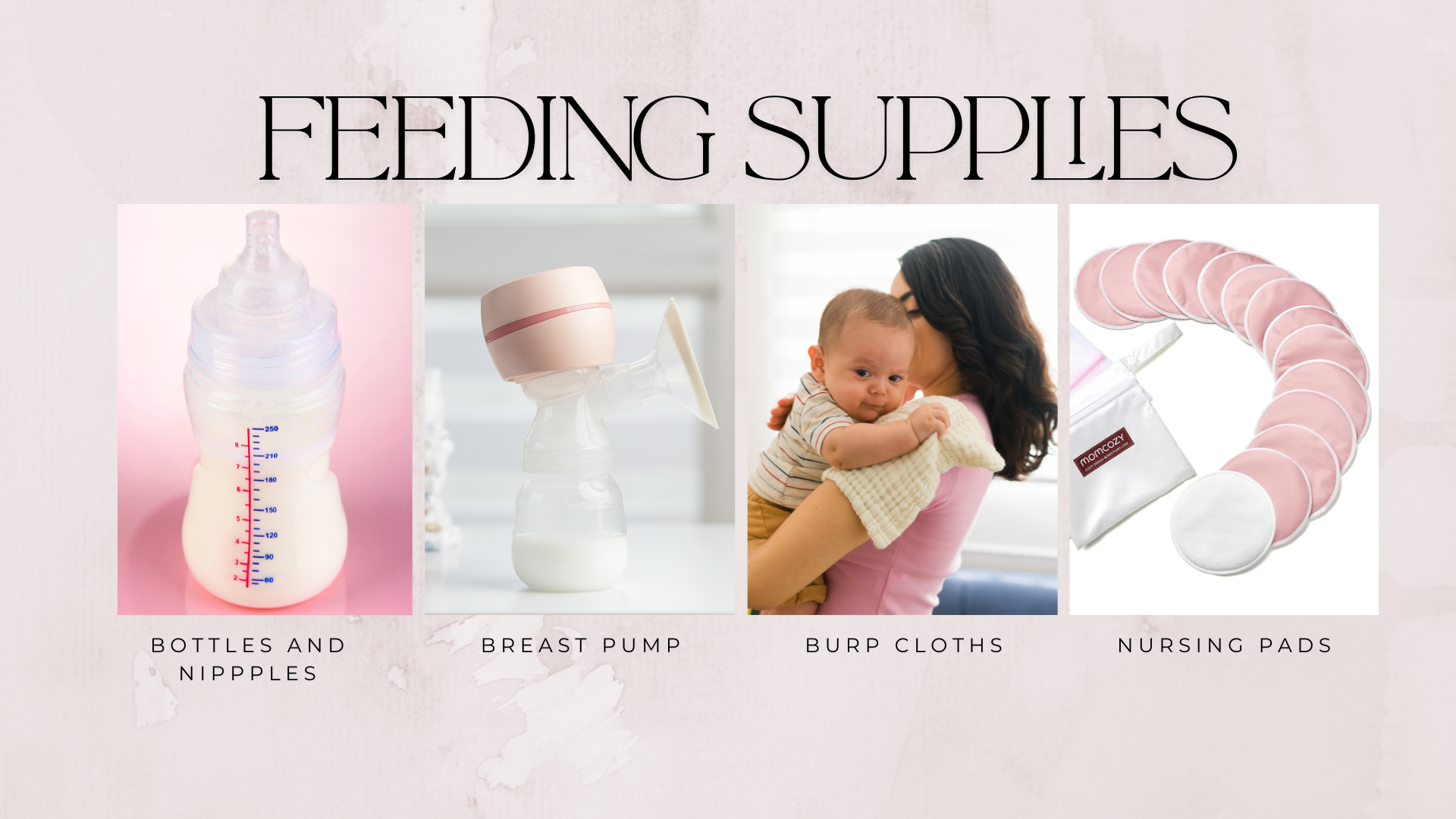
Feeding your baby is one of the most important daily tasks. Having the right tools ready makes the process smoother and less stressful.
- Bottles and nipples: Keep 8–10 bottles, even if you plan to breastfeed. They are useful for pumped milk and allow other caregivers to help with feeding.
- Breast pump: Choose manual or electric based on your routine. A pump makes it easier to store milk and maintain a supply when you’re away from your baby.
- Burp cloths: Babies spit up often, so absorbent cotton burp cloths are a must. Keep several on hand to protect clothing and clean up quickly.
- Nursing pads: Leaks are common during breastfeeding. Disposable or washable nursing pads keep your clothes dry and make nursing more comfortable when you’re out or at home.
Health and Grooming
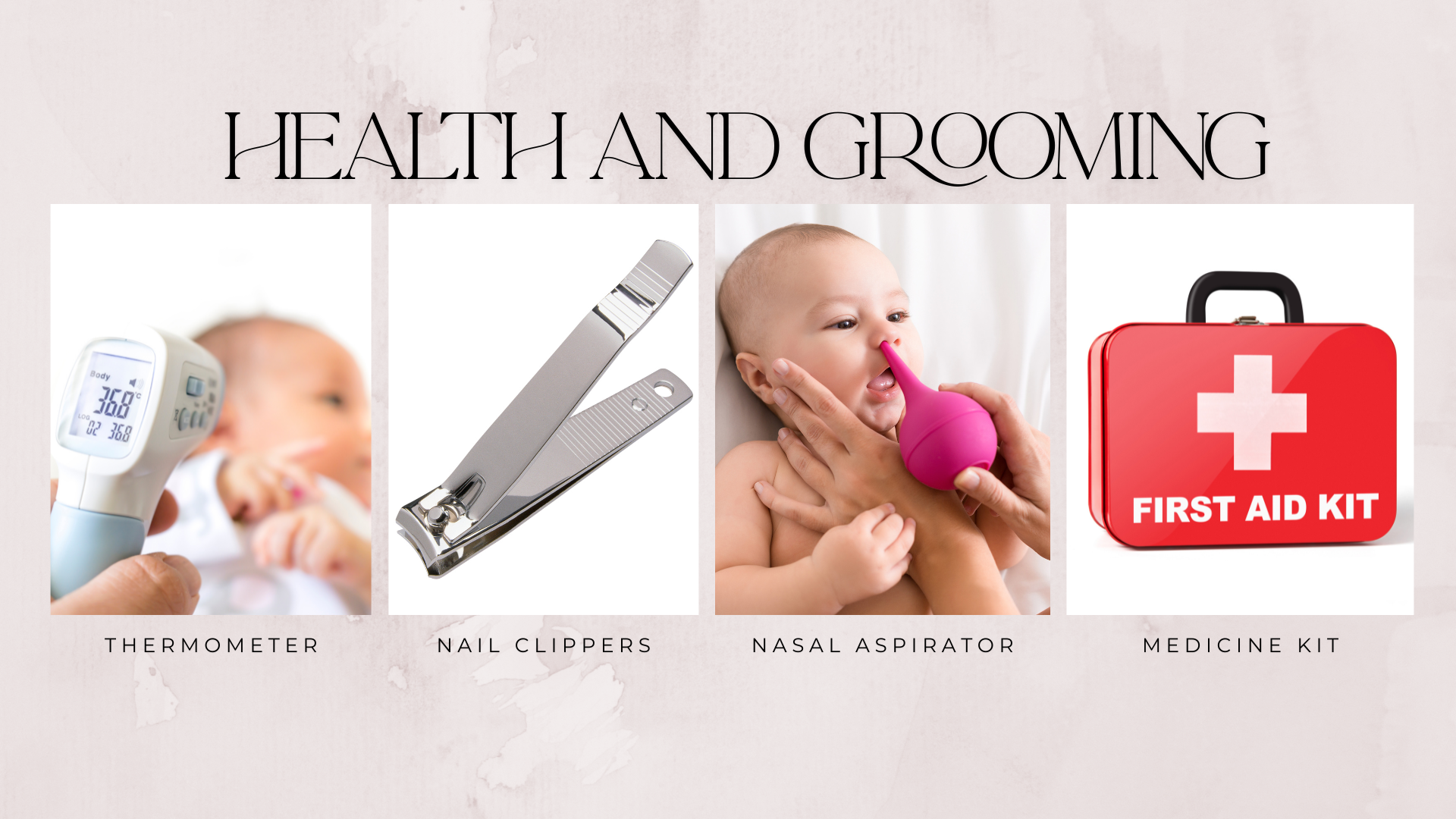
Basic healthcare tools keep your baby safe and comfortable at home. A few essentials will help you handle common needs with ease.
- Thermometer: A digital thermometer is easy to read and reliable. It’s important to monitor your baby’s temperature quickly whenever you suspect fever or illness.
- Nail clippers or file: Baby nails grow fast and can be sharp. Use small, baby-sized clippers or a soft file to trim them safely without risk of cuts.
- Nasal aspirator: Babies often get stuffy noses, making it hard for them to breathe. A nasal aspirator gently clears congestion, helping your newborn breathe and sleep better.
- Medicine kit: Keep basics like gas drops or saline spray ready. Always check with your pediatrician before giving anything, and store items where they’re easy to reach.
Sleep & Nursery Essentials
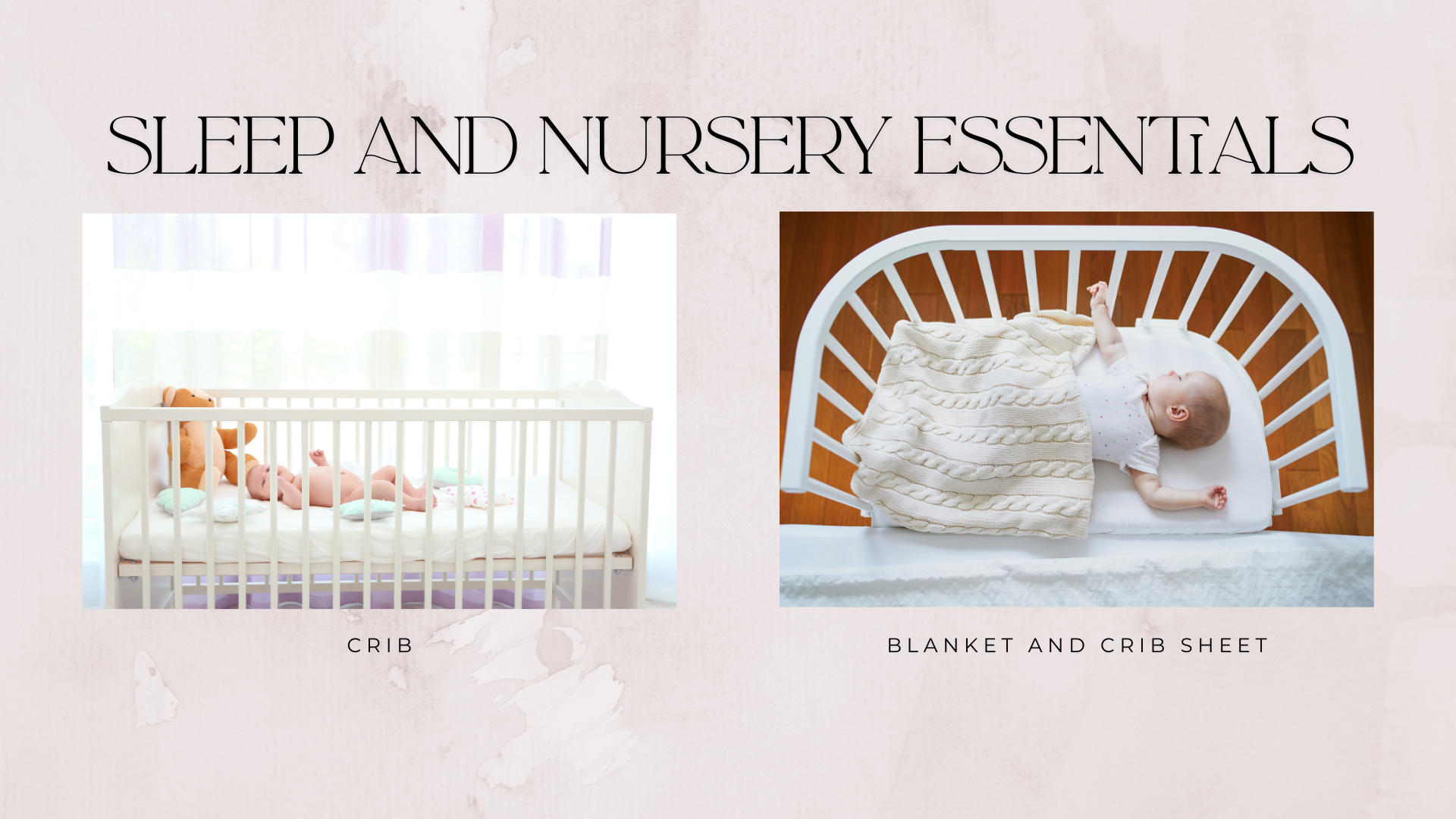
A safe and simple sleep setup is all your baby needs in the first months. Focus on comfort and safety rather than extras.
- Crib, bassinet, or bedside sleeper: Choose one that meets current safety standards. A sturdy, flat surface keeps your baby safe during naps and nighttime sleep.
- Firm mattress with waterproof cover: A snug mattress is essential to reduce risks. A waterproof cover protects it from leaks and makes cleanup quick and easy.
- 2–3 fitted crib sheets: Keep multiple fitted sheets ready for quick changes. They should fit tightly around the mattress to avoid bunching or slipping.
- Swaddles or wearable blankets: These keep your baby warm without loose blankets. Choose soft, breathable fabrics that make your baby feel secure while sleeping.
Bathing & Skincare
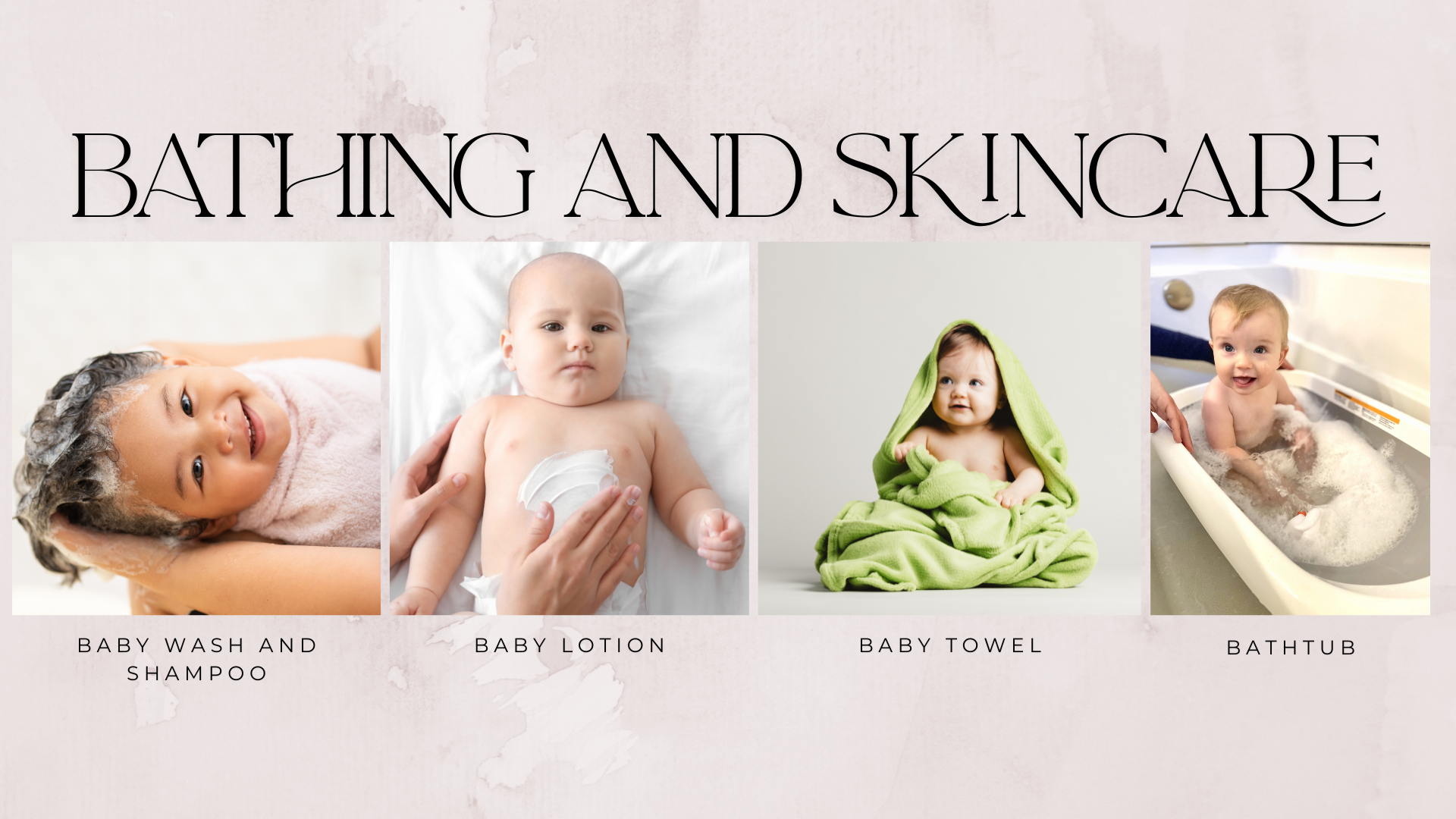
Keeping your baby clean and comfortable doesn’t require many products. Gentle, baby-safe items are all you need for bath time and daily care.
- Baby wash and shampoo: Choose fragrance-free formulas designed for sensitive skin. These are clean without irritation and are safe for daily use on newborns.
- Lotion: A lightweight moisturizer helps prevent dryness. Apply after baths to keep your baby’s skin soft, smooth, and free from irritation.
- Towels and washcloths: Soft cotton towels and small washcloths are gentle on delicate skin. Keep a few extras for quick cleanups throughout the day.
- Baby bathtub: Optional but useful for easier bath time. It supports your newborn safely and makes washing less stressful for both baby and parent.
Diapering Essentials
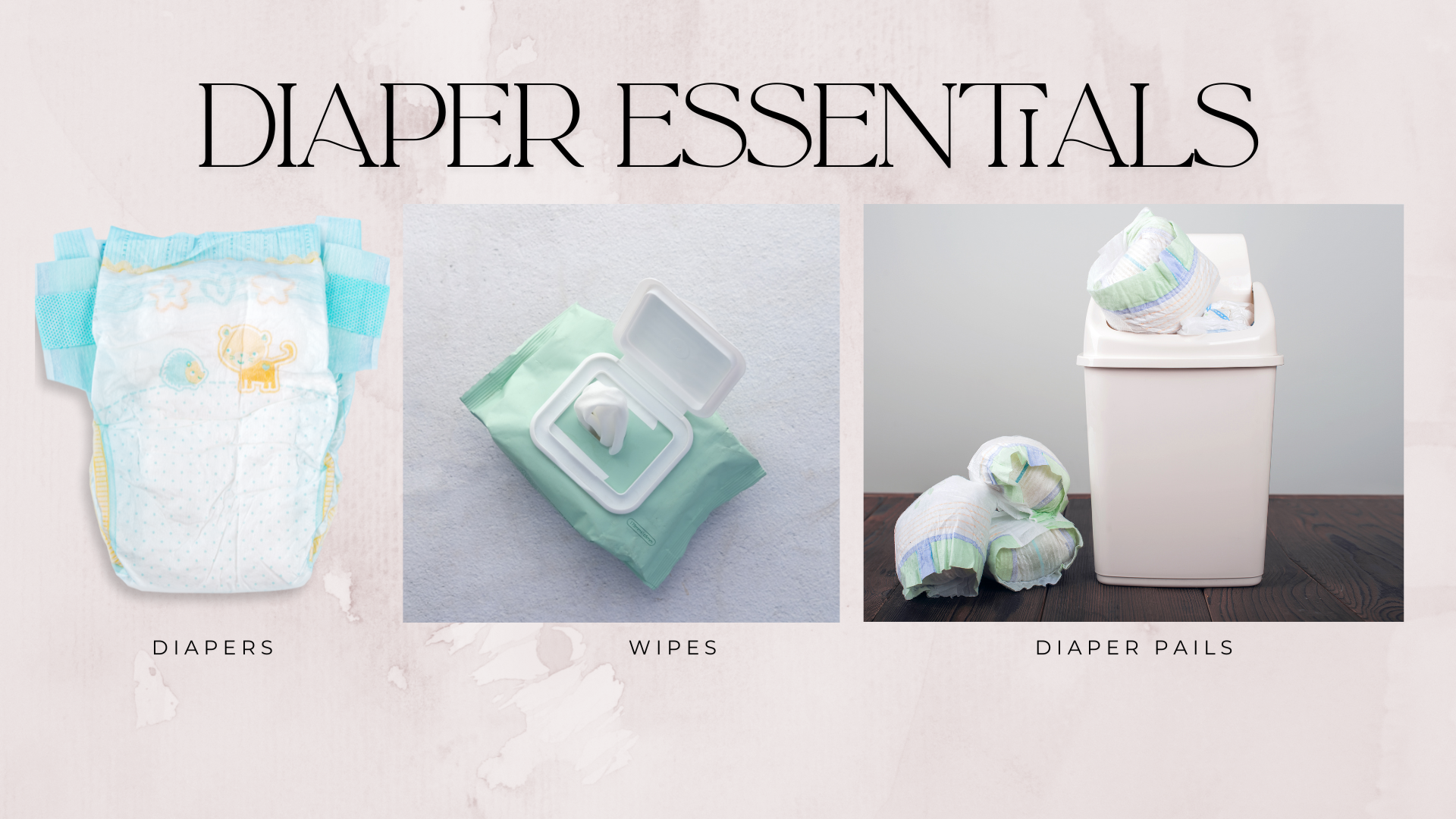
Diapering takes up a big part of newborn care. Having the right supplies ready makes changes easier and keeps your baby comfortable.
- Diapers: Stock up on newborn-size diapers, whether disposable or cloth. Expect to go through 8–12 a day in the early weeks.
- Wipes: Choose unscented, gentle wipes to avoid irritation. They’re essential for cleaning during diaper changes and handy for quick messes.
- Changing pad or table: A clean, safe surface makes changes easier. Use a pad with a cover you can wash often.
- Diaper cream: Keep a protective cream on hand to prevent and treat diaper rashes. Apply a thin layer at each change if needed.
- Diaper pail: Helpful for controlling odor and keeping the nursery clean. Look for one that seals tightly and uses easy-to-replace liners.
Travel & On-the-Go Gear
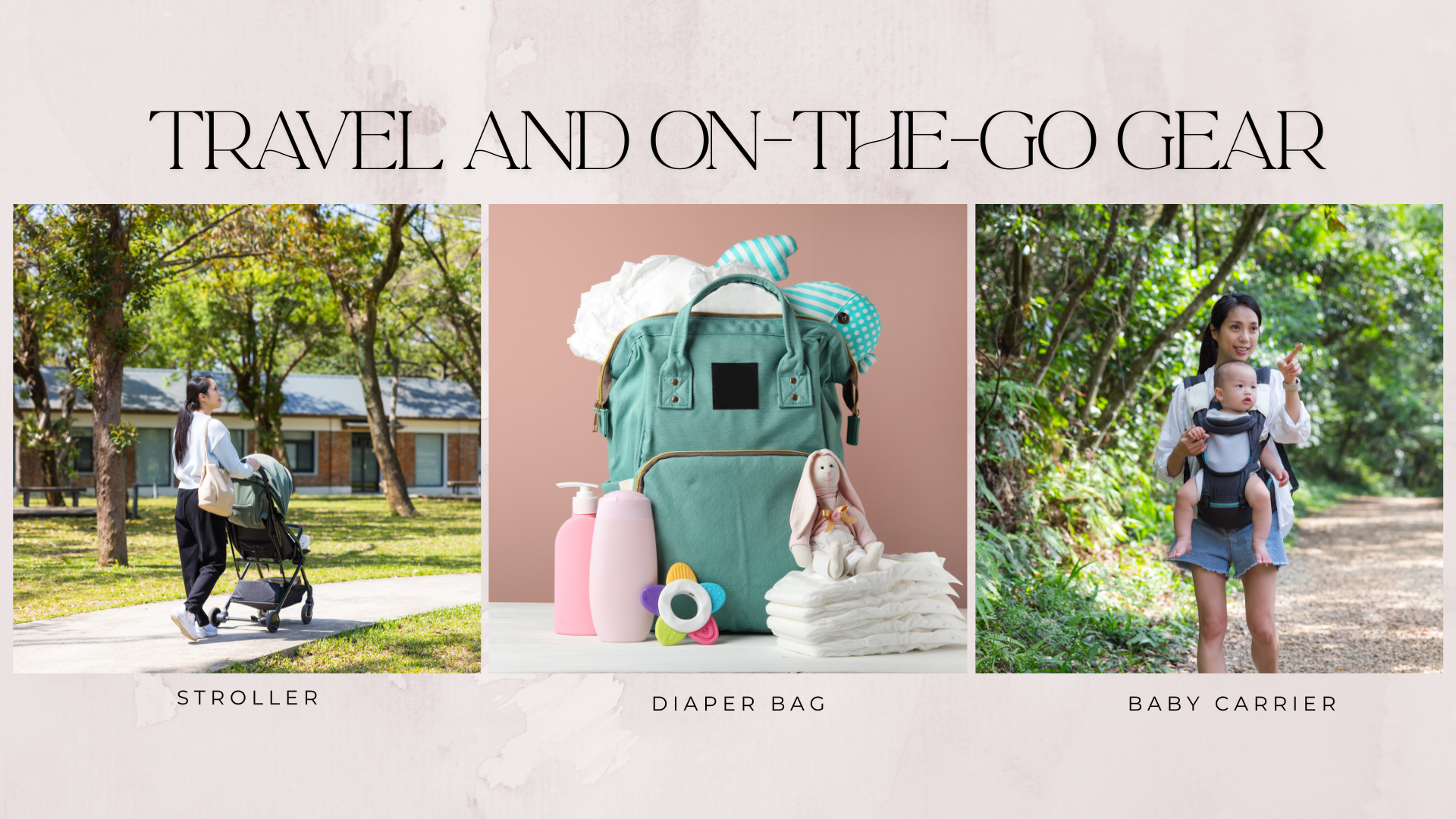
Leaving the house with your newborn is easier when you have the right gear. These essentials keep your baby safe and your trips stress-free.
- Car seat: A rear-facing, safety-approved car seat is a must. Install it before your baby arrives to ensure it fits correctly and securely.
- Stroller: Choose a lightweight stroller or a travel system. It makes outings more comfortable for both you and your baby.
- Diaper bag: A roomy diaper bag with compartments keeps supplies organized. Pack it with diapers, wipes, bottles, and an extra outfit.
- Baby carrier or wrap: Great for hands-free mobility while keeping your baby close. Look for a soft, supportive option that feels comfortable to wear.
Postpartum Recovery for Parents
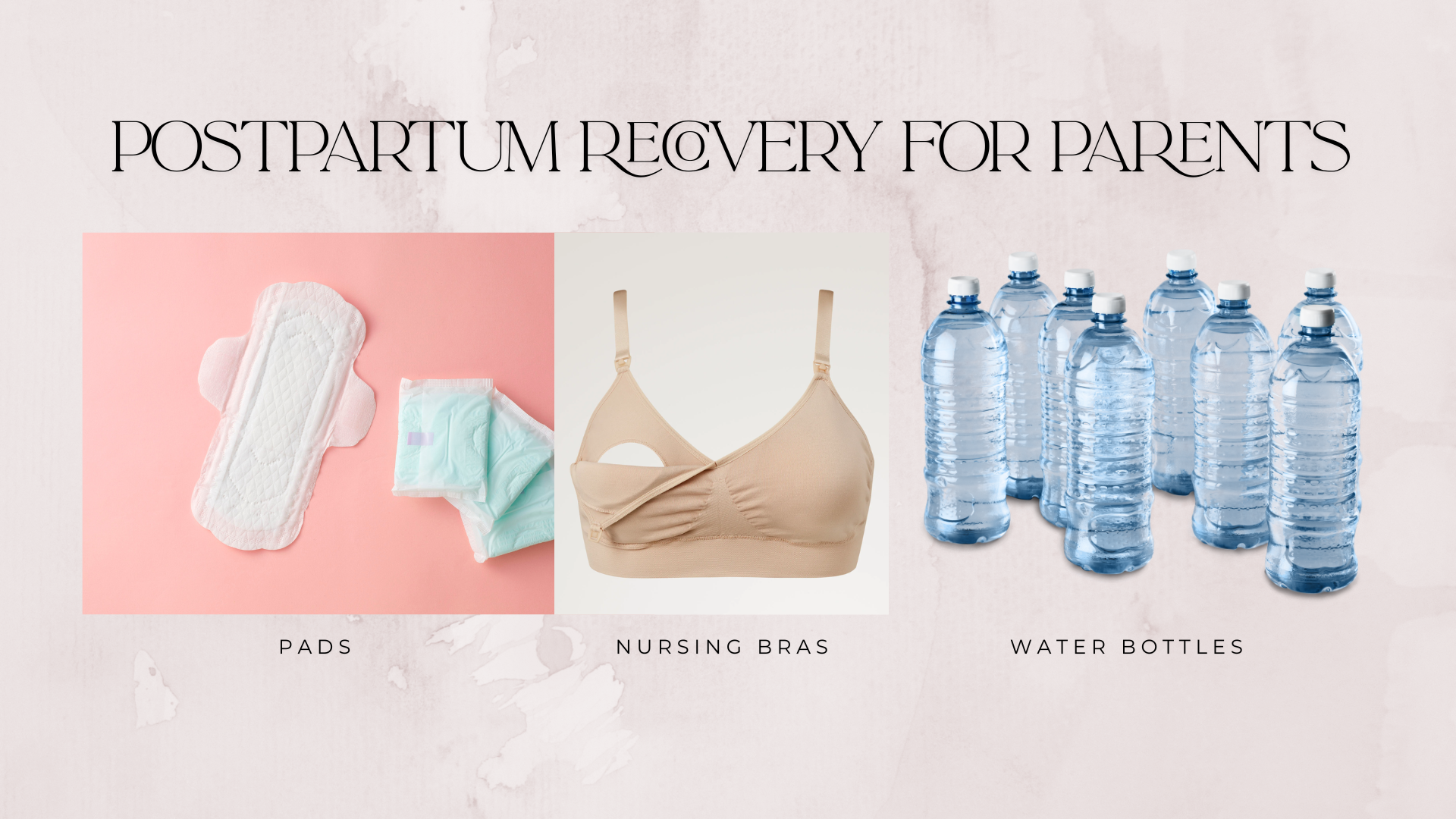
Caring for yourself is just as important as caring for your baby. A few essentials can make recovery more comfortable in the early weeks.
- Nursing bras and pads: Supportive bras and absorbent pads help with comfort and leaks. Washable or disposable options both work well.
- Comfortable clothing: Loose loungewear or soft pajamas make recovery easier. Choose breathable fabrics that keep you comfortable while feeding and resting.
- Peri bottle or sitz bath: These items soothe soreness after delivery. They support healing and make daily hygiene more comfortable.
- Snacks and water bottle: Keep healthy snacks and plenty of water nearby. Staying nourished and hydrated helps you feel better and supports recovery.
Minimalist vs. Comprehensive Essentials
Some parents prefer a small list of basics, while others like a wider range of items. Here’s a comparison to help you decide what fits your lifestyle.
| Category | Minimalist List | Comprehensive List |
|---|---|---|
| Clothing | 6–8 bodysuits, 4 sleepsuits | Full layette set with hats, socks, mittens |
| Feeding | Bottles, breast pump, burp cloths | Bottle sterilizer, warmer, extra storage bags |
| Health | Thermometer, nail clippers, nasal aspirator | Full grooming kit, baby monitor |
| Sleep & Nursery | Crib/bassinet, fitted sheets, swaddles | Glider, white noise machine, multiple bedding sets |
| Diapering | Diapers, wipes, diaper cream | Diaper pail, wipe warmer, changing table |
| Travel | Car seat, diaper bag | Stroller, carrier, portable crib |
Think about your lifestyle, budget, and home space to decide which approach works for you.
How to Choose the Right Baby Essentials
Choosing baby essentials can be overwhelming with the numerous products available. Focus on safety, comfort, and practicality to guide your decisions.
Always check that cribs, car seats, and feeding tools meet current safety standards. Products designed for newborns should have clear labels and trusted certifications.
Think about your lifestyle when making choices. A compact stroller may work better in a city, while extra sleepwear might be needed in colder climates.
Avoid buying too much before your baby arrives. Start with the basics, see what works for you, and then add items as your needs grow.
Cost Guide for Newborn Essentials
Preparing for a baby can add up, but costs vary depending on your choices. Here’s a breakdown of what you can expect to spend in each category.
| Category | Estimated Cost Range |
|---|---|
| Clothing | $100 – $200 to start |
| Feeding | $150 – $300 |
| Health & Grooming | $50 – $100 |
| Sleep & Nursery | $300 – $800 (crib choice matters) |
| Diapering | $50 – $80 per month |
| Travel Gear | $200 – $500 (car seat + stroller) |
Savings Tips
Preparing for a baby can feel expensive, but there are simple ways to cut costs. Planning ahead and using resources wisely makes a big difference.
- Registry benefits: Baby registries often come with discounts and free samples. Many also offer completion deals once your shopping list is finished.
- Bundles and gift sets: Kits usually cost less than buying single items. Look for clothing, grooming, or feeding bundles to stretch your money further.
- Secondhand options: Gently used items can save a lot. Avoid secondhand cribs or car seats unless you’re sure they meet current safety standards.
- Seasonal sales: Buying during sales helps you stock up at lower prices. Larger clothing sizes are smart purchases since babies grow quickly.
- Borrowing from family or friends: Babies outgrow items fast, so borrowing makes sense. Gear like bassinets or swings is often used for only a few months.
Conclusion
Getting ready for a baby doesn’t have to be overwhelming. A newborn essentials checklist keeps things simple and makes sure you have what really matters.
With the basics for clothing, feeding, sleep, and care, you’ll feel prepared without filling your home with unnecessary items. I’ve learned that starting small is best.
Now it’s your turn to use this checklist as your guide. Share it with other parents, save it for your registry planning, and make newborn care easier from the very beginning.

